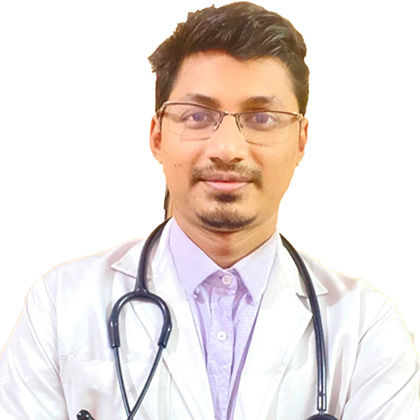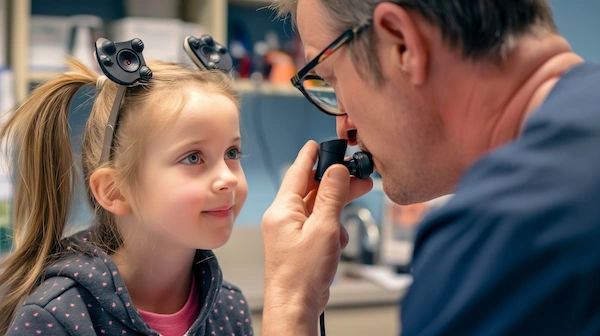Guide to Lung Health Awareness
Learn how to improve your lung health and recognize the signs of common respiratory illnesses. This guide offers practical tips, from lifestyle changes to understanding air quality, to help you breathe easier and live healthier.

Written by Dr. Dhankecha Mayank Dineshbhai
Reviewed by Dr. Vasanthasree Nair MBBS
Last updated on 13th Jan, 2026

Breathe Easy: Your Ultimate Guide to Lung Health Awareness
Introduction
We take over 20,000 breaths a day, often without a second thought. Our lungs are the silent, hardworking engines of our body, tirelessly supplying lifegiving oxygen and expelling waste carbon dioxide. Yet, we frequently take their health for granted until a problem arises. Lung health awareness is not just for smokers or those with existing conditions; it's a critical component of overall wellness for everyone. From the air we breathe to the activities we love, healthy lungs are fundamental to a vibrant, active life. This comprehensive guide will walk you through everything you need to know—from understanding how your lungs work and recognizing early warning signs of disease to practical, daily habits you can adopt to protect and strengthen your respiratory system. Let's dive in and learn how to support these vital organs so you can continue to breathe easy for years to come.
Why Lung Health is Fundamental to Your Wellbeing?
Your lungs are among the body's largest organs and are central to your survival. Their primary role is respiratory gas exchange, a process that powers every single cell in your body.
The Amazing Mechanics of Breathing
- Breathing is an intricate dance between your lungs, diaphragm, and intercostal muscles. When you inhale, your diaphragm contracts and flattens, creating a vacuum that pulls air rich with oxygen into your lungs through your trachea and bronchial tubes. This oxygen passes through tiny sacs called alveoli into your bloodstream, where it's carried to your heart and then pumped throughout your body. Simultaneously, carbon dioxide, a waste product of metabolism, moves from the blood into the alveoli to be exhaled. This entire process is both involuntary and remarkably efficient.
More Than Just Oxygen: Other Vital Lung Functions
- Beyond gas exchange, your lungs play other crucial roles. They act as a filter, protecting your body from harmful airborne particles. Small hairs called cilia and mucus trap dust, germs, and allergens, which are then expelled through coughing or swallowing. The lungs also help regulate your body's pH balance by controlling the level of carbon dioxide in your blood, which is essential for all your physiological systems to function correctly.
Consult a General Physician for the best advice
Common Threats to Your Respiratory System
Several diseases can impair lung function, ranging from chronic conditions to infections. Understanding these is the first step toward prevention.
Chronic Obstructive Pulmonary Disease (COPD)
- COPD is an umbrella term for progressive lung diseases, primarily emphysema and chronic bronchitis. It's characterized by increasing breathlessness. The primary cause is longterm exposure to irritating gases or particulate matter, most often from cigarette smoke. According to the World Health Organization (WHO), COPD is the third leading cause of death worldwide. Symptoms develop slowly and can significantly reduce quality of life.
Lung Cancer: Early Detection is Key
- Lung cancer is the leading cause of cancer deaths globally. It often presents with no symptoms in its early stages, which is why awareness and screening for high risk individuals are paramount. While smoking is the biggest risk factor, exposure to radon gas, asbestos, and other carcinogens also contributes. Advances in low-dose CT scans have dramatically improved early detection rates, which greatly increases the chances of successful treatment.
Asthma and Its Triggers
- Asthma is a chronic condition where the airways become inflamed, narrow, and produce extra mucus, making breathing difficult. It can cause wheezing, coughing, and chest tightness. Triggers vary widely and can include allergens (pollen, dust mites), air pollution, respiratory infections, and even exercise. Understanding and avoiding personal triggers is a cornerstone of managing asthma symptoms effectively.
The Impact of Pneumonia and Infections
- Pneumonia is an infection that inflames the air sacs in one or both lungs, which may fill with fluid or pus. It can be caused by a variety of organisms, including bacteria, viruses, and fungi. While healthy people can often recover, pneumonia can be life threatening for infants, young children, older adults, and those with weakened immune systems. Vaccinations for flu and pneumococcal pneumonia are vital preventive measures.
Listen to Your Body: Recognizing Warning Signs
Your body often sends signals when something is wrong with your lungs. Learning to recognize these early signs of lung disease can lead to earlier intervention and better outcomes.
Persistent Cough: When to Be Concerned
- A cough that lasts for more than eight weeks is considered chronic and warrants medical attention. While it can be caused by postnasal drip or asthma, a persistent cough is also a primary symptom of COPD and lung cancer. Pay special attention if the cough changes character, produces blood (hemoptysis), or rustcolored phlegm.
Shortness of Breath and Wheezing
Feeling short of breath after intense exercise is normal, but becoming winded after minimal effort or at rest is not. Wheezing—a whistling sound when you breathe—indicates that your airways are narrowed or blocked. If your shortness of breath is new, persistent, or interfering with daily activities, it's crucial to consult a doctor. If symptoms persist beyond two weeks, consult a doctor online with Apollo24|7 for further evaluation.
Chest Pain and Unexplained Weight Loss
- Chronic lung pain that worsens with deep breathing, coughing, or laughing can be a sign of several conditions. When coupled with unexplained weight loss and fatigue, it can indicate a more serious underlying issue like lung cancer or a chronic infection, and requires immediate medical investigation.
Proactive Steps for Healthy Lungs
The good news is that you have significant power to protect and improve your lung health through lifestyle choices.
The Single Best Thing You Can Do: Quit Smoking
- If you smoke, quitting is the most effective step you can take. According to the American Lung Association, within just 12 hours of quitting, the carbon monoxide level in your blood drops to normal. Over time, your lung function can improve, and your risk of cancer and COPD decreases dramatically. Avoid secondhand smoke as well, as it contains hundreds of toxic chemicals.
Exercise to Boost Lung Capacity
- When you are physically active, your heart and lungs work harder to supply oxygen to your muscles. This exercise strengthens them, much like it strengthens any other muscle. Aerobic activities like walking, running, swimming, and cycling are excellent for improving lung capacity and efficiency. Even simple deep breathing exercises can help.
Minimizing Exposure to Indoor and Outdoor Pollutants
- Outdoor air pollution can irritate or damage the lungs. On high pollution days, limit outdoor exercise. Indoors, common pollutants include radon (a colorless, odorless gas that can cause lung cancer), chemical fumes from household cleaners, and mold. Test your home for radon, use natural cleaning products, and ensure good ventilation. Using an air purifier can also help reduce indoor allergens.
The Role of Diet and Hydration
- A diet rich in antioxidants can help reduce inflammation and protect lung tissue. Focus on fruits, tomatoes, leafy greens, and fatty fish. Staying well hydrated is equally important, as it keeps the mucosal linings in the lungs thin, which helps them function better.
The Importance of Regular Checkups and Screening
Preventive healthcare is a powerful tool. Even if you feel healthy, discussing your lung health with a doctor is important, especially if you have risk factors.
Who Should Consider Lung Cancer Screening?
- Annual screening with a low-dose CT scan is recommended for adults aged 50 to 80 who have a significant smoking history (e.g., a 20 "packyear" history) and currently smoke or have quit within the past 15 years. This screening has been shown to reduce mortality by detecting cancer at its earliest, most treatable stages.
Understanding Pulmonary Function Tests
- If you have symptoms like chronic shortness of breath, your doctor may recommend a pulmonary function test (PFT). This noninvasive test measures how well your lungs work—how much air they can hold and how effectively they move air in and out. Apollo24|7 offers convenient home collection for tests like vitamin D or HbA1c, but PFTs are typically conducted in a clinic or hospital setting to accurately diagnose conditions like asthma and COPD.
Conclusion
Cultivating lung health awareness is an ongoing commitment to your long-term wellbeing. By understanding how your respiratory system works, recognizing the early warning signs of disease, and adopting proactive, healthy habits, you empower yourself to protect these essential organs. The choices you make every day—from the air you breathe to the food you eat and your activity level—collectively contribute to your lung capacity and resilience. Remember, it's never too late to start making positive changes. If you have any concerns about your respiratory health or fall into a high risk category, take that crucial next step: have a conversation with a healthcare professional. Your future self will thank you for every deep, easy breath you're able to take.
Consult a General Physician
Consult a General Physician

Dr. Rajib Ghose
General Physician/ Internal Medicine Specialist
25 Years • MBBS
East Midnapore
VIVEKANANDA SEBA SADAN, East Midnapore

Dr. Tamal Bhattacharyya
Pulmonology Respiratory Medicine Specialist
8 Years • MBBS, MD (Respiratory Medicine)
Kolkata
MCR SUPER SPECIALITY POLY CLINIC & PATHOLOGY, Kolkata

Dr. Swagato Podder
General Practitioner
5 Years • MBBS
Kolkata
GRD POLYCLINIC, Kolkata

Dr. Harshendra Jaiswal
General Physician/ Internal Medicine Specialist
12 Years • MBBS , MD (General medicine)
Kolkata
108 DHANA DHANVANTARI Clinic, Kolkata
(25+ Patients)

Dr. Vishal Kumar H
General Physician/ Internal Medicine Specialist
8 Years • MBBS, master class in critical care medicine, Advanced Post Graduate Diploma in Non Invasive Cardiology, certificate course in Cardiovascular Disease & Stroke, Certificate course in Common Mental Disorder
Bengaluru
Apollo Clinic, Basavanagudi, Bengaluru
Consult a General Physician for the best advice

Dr. Rajib Ghose
General Physician/ Internal Medicine Specialist
25 Years • MBBS
East Midnapore
VIVEKANANDA SEBA SADAN, East Midnapore

Dr. Tamal Bhattacharyya
Pulmonology Respiratory Medicine Specialist
8 Years • MBBS, MD (Respiratory Medicine)
Kolkata
MCR SUPER SPECIALITY POLY CLINIC & PATHOLOGY, Kolkata

Dr. Swagato Podder
General Practitioner
5 Years • MBBS
Kolkata
GRD POLYCLINIC, Kolkata

Dr. Harshendra Jaiswal
General Physician/ Internal Medicine Specialist
12 Years • MBBS , MD (General medicine)
Kolkata
108 DHANA DHANVANTARI Clinic, Kolkata
(25+ Patients)

Dr. Vishal Kumar H
General Physician/ Internal Medicine Specialist
8 Years • MBBS, master class in critical care medicine, Advanced Post Graduate Diploma in Non Invasive Cardiology, certificate course in Cardiovascular Disease & Stroke, Certificate course in Common Mental Disorder
Bengaluru
Apollo Clinic, Basavanagudi, Bengaluru
More articles from General Medical Consultation
Frequently Asked Questions
Can lung damage from smoking be reversed?
While not all damage can be reversed, your lungs have a remarkable ability to heal. When you quit smoking, the cilia in your airways begin to repair themselves and function better, reducing your risk of infection. Inflammation also decreases over time, leading to improved lung function and a lower risk of disease progression.
What are the best exercises for improving lung capacity?
Aerobic exercises that get your heart rate up are best for strengthening your lungs. This includes brisk walking, jogging, swimming, and cycling. Additionally, focused breathing exercises like pursedlip breathing and diaphragmatic (belly) breathing can help improve the efficiency of your lungs and manage shortness of breath.
How can I tell if my shortness of breath is serious?
You should seek medical advice if your shortness of breath is unexpected, persistent, or interferes with your daily activities. Urgent care is needed if it is accompanied by chest pain, fainting, nausea, or bluish lips or fingernails, as these could indicate a serious heart or lung problem.
Are home air purifiers effective for lung health?
Yes, high-efficiency particulate air (HEPA) purifiers can be effective at removing many airborne allergens and pollutants like dust, pollen, and pet dander from a single room. They are particularly beneficial for people with allergies or asthma. However, they are not a substitute for eliminating the source of pollution (like smoking indoors) and ensuring proper ventilation.
What is a 'packyear' and why is it important?
A packyear is a unit for measuring the amount a person has smoked over time. It is calculated by multiplying the number of packs of cigarettes smoked per day by the number of years the person has smoked. For example, smoking one pack a day for 20 years equals 20 packyears. Doctors use this metric to assess your risk for lung cancer and determine if you are a candidate for screening.




